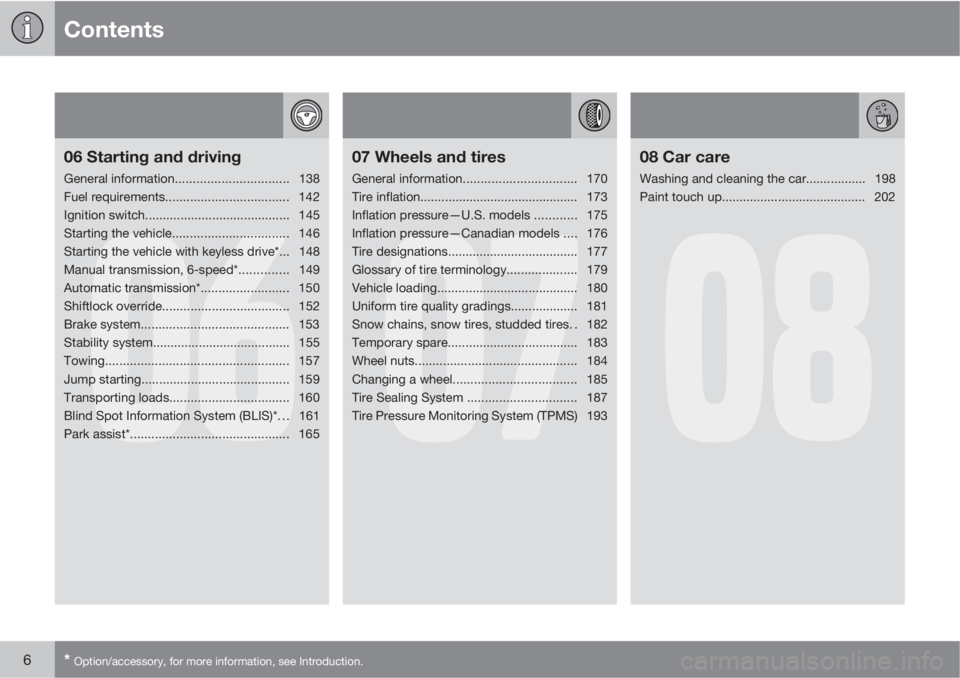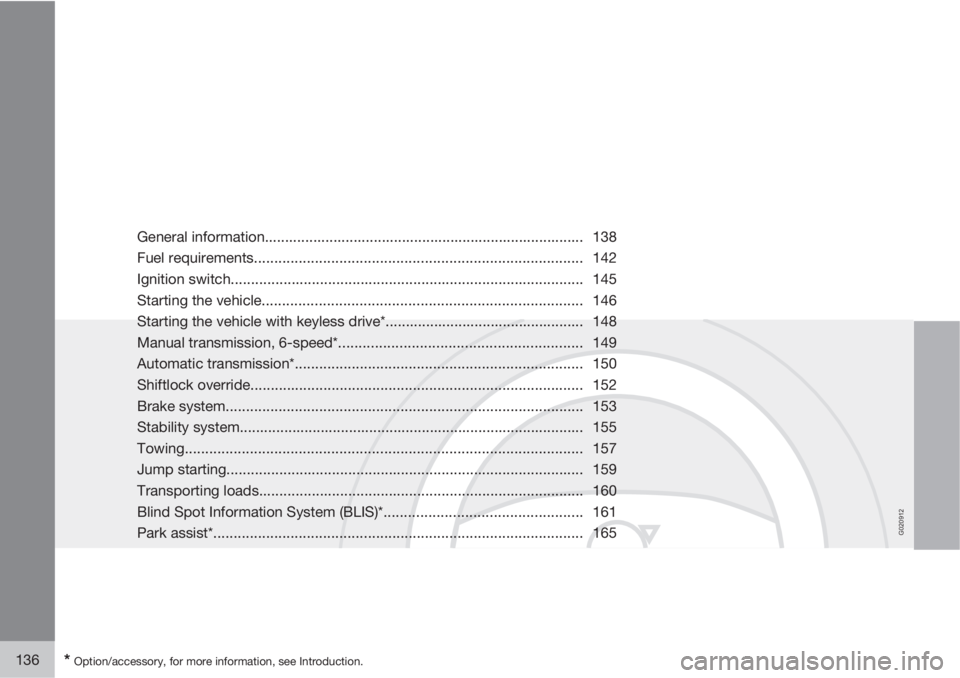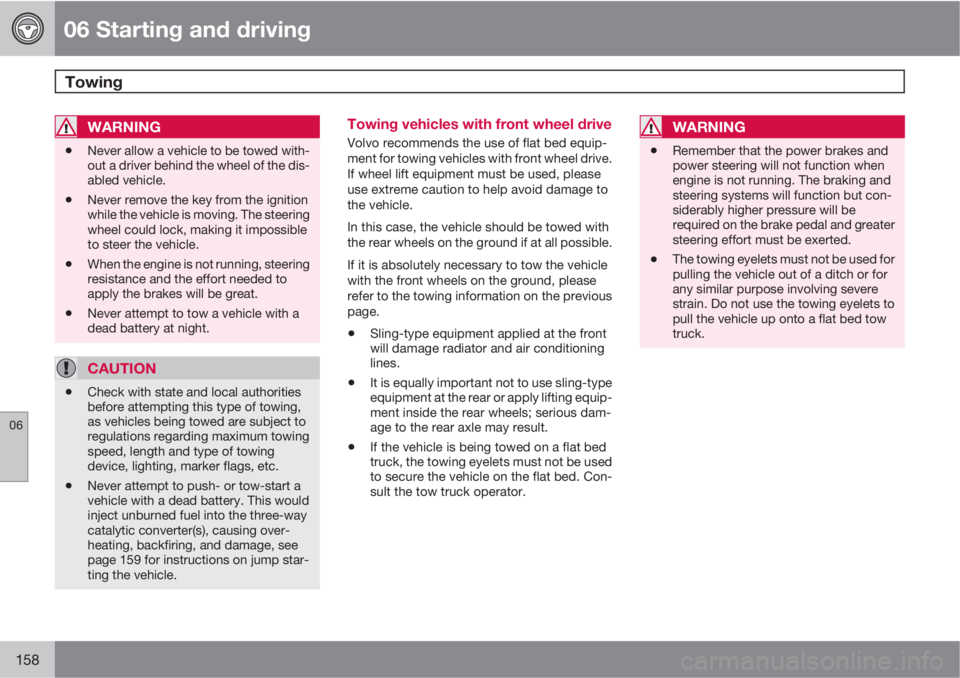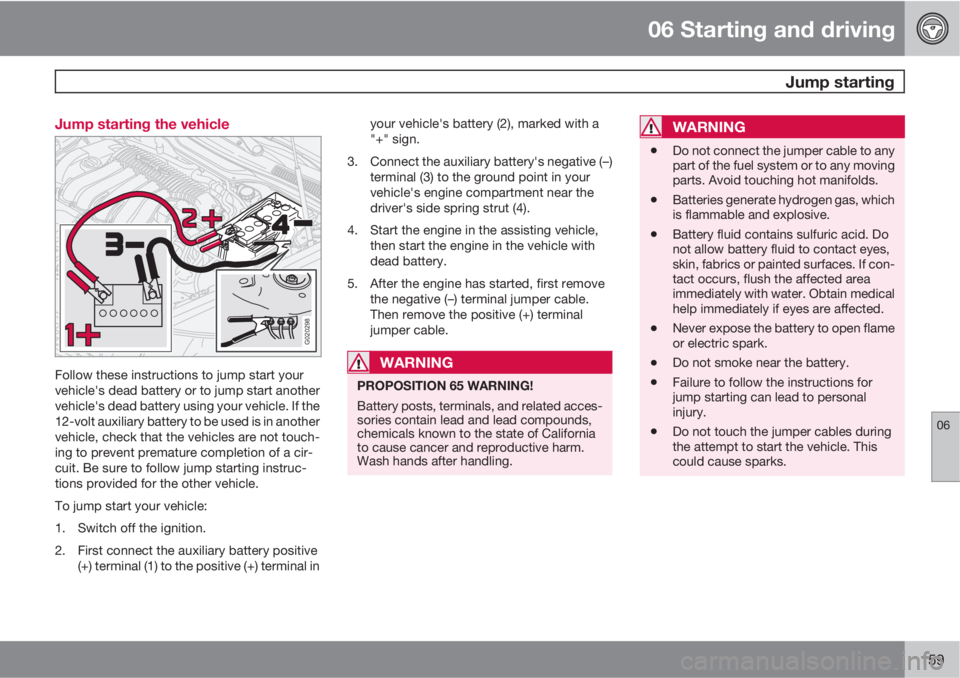jump start VOLVO C30 2010 Owner´s Manual
[x] Cancel search | Manufacturer: VOLVO, Model Year: 2010, Model line: C30, Model: VOLVO C30 2010Pages: 284, PDF Size: 6.58 MB
Page 6 of 284

Contents
6* Option/accessory, for more information, see Introduction.
06
06 Starting and driving
General information................................138
Fuel requirements................................... 142
Ignition switch......................................... 145
Starting the vehicle................................. 146
Starting the vehicle with keyless drive*... 148
Manual transmission, 6-speed*.............. 149
Automatic transmission*......................... 150
Shiftlock override.................................... 152
Brake system.......................................... 153
Stability system....................................... 155
Towing.................................................... 157
Jump starting.......................................... 159
Transporting loads.................................. 160
Blind Spot Information System (BLIS)*. . . 161
Park assist*............................................. 165
07
07 Wheels and tires
General information................................170
Tire inflation............................................. 173
Inflation pressure—U.S. models ............ 175
Inflation pressure—Canadian models .... 176
Tire designations..................................... 177
Glossary of tire terminology.................... 179
Vehicle loading........................................ 180
Uniform tire quality gradings................... 181
Snow chains, snow tires, studded tires. . 182
Temporary spare..................................... 183
Wheel nuts.............................................. 184
Changing a wheel................................... 185
Tire Sealing System ............................... 187
Tire Pressure Monitoring System (TPMS) 193
08
08 Car care
Washing and cleaning the car................. 198
Paint touch up......................................... 202
Page 136 of 284

G020912
136* Option/accessory, for more information, see Introduction.
General information............................................................................... 138
Fuel requirements................................................................................. 142
Ignition switch....................................................................................... 145
Starting the vehicle............................................................................... 146
Starting the vehicle with keyless drive*................................................. 148
Manual transmission, 6-speed*............................................................ 149
Automatic transmission*....................................................................... 150
Shiftlock override.................................................................................. 152
Brake system........................................................................................ 153
Stability system..................................................................................... 155
Towing.................................................................................................. 157
Jump starting........................................................................................ 159
Transporting loads................................................................................ 160
Blind Spot Information System (BLIS)*................................................. 161
Park assist*........................................................................................... 165
Page 158 of 284

06 Starting and driving
Towing
06
158
WARNING
•Never allow a vehicle to be towed with-
out a driver behind the wheel of the dis-
abled vehicle.
•Never remove the key from the ignition
while the vehicle is moving. The steering
wheel could lock, making it impossible
to steer the vehicle.
•When the engine is not running, steering
resistance and the effort needed to
apply the brakes will be great.
•Never attempt to tow a vehicle with a
dead battery at night.
CAUTION
•Check with state and local authorities
before attempting this type of towing,
as vehicles being towed are subject to
regulations regarding maximum towing
speed, length and type of towing
device, lighting, marker flags, etc.
•Never attempt to push- or tow-start a
vehicle with a dead battery. This would
inject unburned fuel into the three-way
catalytic converter(s), causing over-
heating, backfiring, and damage, see
page 159 for instructions on jump star-
ting the vehicle.
Towing vehicles with front wheel drive
Volvo recommends the use of flat bed equip-
ment for towing vehicles with front wheel drive.
If wheel lift equipment must be used, please
use extreme caution to help avoid damage to
the vehicle.
In this case, the vehicle should be towed with
the rear wheels on the ground if at all possible.
If it is absolutely necessary to tow the vehicle
with the front wheels on the ground, please
refer to the towing information on the previous
page.
•Sling-type equipment applied at the front
will damage radiator and air conditioning
lines.
•It is equally important not to use sling-type
equipment at the rear or apply lifting equip-
ment inside the rear wheels; serious dam-
age to the rear axle may result.
•If the vehicle is being towed on a flat bed
truck, the towing eyelets must not be used
to secure the vehicle on the flat bed. Con-
sult the tow truck operator.
WARNING
•Remember that the power brakes and
power steering will not function when
engine is not running. The braking and
steering systems will function but con-
siderably higher pressure will be
required on the brake pedal and greater
steering effort must be exerted.
•The towing eyelets must not be used for
pulling the vehicle out of a ditch or for
any similar purpose involving severe
strain. Do not use the towing eyelets to
pull the vehicle up onto a flat bed tow
truck.
Page 159 of 284

06 Starting and driving
Jump starting
06
159 Jump starting the vehicle
G020298
Follow these instructions to jump start your
vehicle's dead battery or to jump start another
vehicle's dead battery using your vehicle. If the
12-volt auxiliary battery to be used is in another
vehicle, check that the vehicles are not touch-
ing to prevent premature completion of a cir-
cuit. Be sure to follow jump starting instruc-
tions provided for the other vehicle.
To jump start your vehicle:
1. Switch off the ignition.
2. First connect the auxiliary battery positive
(+) terminal (1) to the positive (+) terminal inyour vehicle's battery (2), marked with a
"+" sign.
3. Connect the auxiliary battery's negative (–)
terminal (3) to the ground point in your
vehicle's engine compartment near the
driver's side spring strut (4).
4. Start the engine in the assisting vehicle,
then start the engine in the vehicle with
dead battery.
5. After the engine has started, first remove
the negative (–) terminal jumper cable.
Then remove the positive (+) terminal
jumper cable.WARNING
PROPOSITION 65 WARNING!
Battery posts, terminals, and related acces-
sories contain lead and lead compounds,
chemicals known to the state of California
to cause cancer and reproductive harm.
Wash hands after handling.
WARNING
•Do not connect the jumper cable to any
part of the fuel system or to any moving
parts. Avoid touching hot manifolds.
•Batteries generate hydrogen gas, which
is flammable and explosive.
•Battery fluid contains sulfuric acid. Do
not allow battery fluid to contact eyes,
skin, fabrics or painted surfaces. If con-
tact occurs, flush the affected area
immediately with water. Obtain medical
help immediately if eyes are affected.
•Never expose the battery to open flame
or electric spark.
•Do not smoke near the battery.
•Failure to follow the instructions for
jump starting can lead to personal
injury.
•Do not touch the jumper cables during
the attempt to start the vehicle. This
could cause sparks.
Page 279 of 284

12 Index
12
279
Hoisting the vehicle.................................208
Home safe lighting............................... 65, 83
Hood, opening......................................... 210
I
Ignition switch.......................................... 145
Immobilizer.............................................. 146
Immobilizer (start inhibitor)...................... 122
Indicator and warning symbols............ 53, 55
Inflatable Curtain........................................ 30
Inflation pressure..................................... 173
Inflation pressure, checking..................... 174
Inflation pressure table
Canadian models................................ 176
US models.......................................... 175
Information display..............................53, 60
messages in.......................................... 60
Information symbol.................................... 55
Inspection, preparing for......................... 208
Inspection readiness................................ 208
Instrument overview.................................. 50
Instrument panel.................................. 50, 53Instrument panel lighting........................... 64
Interior lighting......................................... 110
iPod�Ÿ connector (audio system)............. 237
ISOFIX/LATCH anchors............................. 44J
Jacket hanger.......................................... 112
Jump starting........................................... 159
K
Key (ignition switch) positions................. 145
Key blade.........................................124, 128
Keyless drive
location of antennas (pacemaker warn-
ing)...................................................... 129
locking and unlocking the vehicle...... 127
power seat memory............................ 128
starting the engine.............................. 148
Keylock.................................................... 146
Kickdown.................................................151
L
Label information..................................... 262
LATCH (ISOFIX) anchors........................... 44
Liftgate wiper........................................... 216
Liftgate wiper/washer................................ 72
Lighting panel............................................ 63
Load anchoring eyelets...........................117
Loading the vehicle
roof loads............................................ 160
Locking
from the inside.................................... 131
glove compartment............................. 131
Locking the vehicle.................................. 127
Long distance trips.................................. 140
Lug nuts (wheel nuts)............................... 184
M
Maintenance............................................ 206
hoisting the vehicle............................. 208
performed by the owner.....................208
Manual climate control.............................. 93
Manual transmission................................ 149